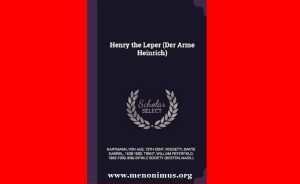Der Arme Heinrich | Poor Henry | Hartmann von Aue | A Review
Der Arme Heinrich Poor Henry Hartmann von Aue A Review
Der Arme Heinrich (Poor Henry) by Hartmann von Aue- A Review
Hartmann von Aue’s ‘Der Arme Heinrich’ (Poor Henry) stands as a remarkable piece of medieval literature, representing a significant contribution to the courtly romance genre. This narrative unfolds a tale of suffering, redemption, and the transformative power of love, revealing the depths of human emotions and the complex moral dilemmas that individuals face. Through its carefully crafted characters, thematic depth, and lyrical language, the story captivates readers, leaving a lasting impact on their understanding of love, faith, and the human condition.
Synopsis:
The narrative revolves around the central character, Henry, a nobleman who is struck with a mysterious ailment that leaves him disfigured and bedridden. His suffering is perceived as a divine punishment, and he despairs of ever recovering. In a desperate search for a cure, Henry learns that the only way to heal is through the sacrifice of a pure, virtuous maiden who willingly offers her life for his salvation. The narrative unfolds as Henry’s quest for a selfless act of love presents him with the ultimate moral dilemma, while the maiden grapples with the choice between her life and her devotion to a suffering stranger.
Character Depth:
Hartmann von Aue exhibits a remarkable skill in developing multi-dimensional characters that mirror the complexities of human nature. Henry’s internal struggle reflects the anguish of an individual grappling with his fate, while the maiden’s internal conflict mirrors the tension between her self-preservation and her compassion for another’s suffering. The characters are not merely vessels for the plot but rather individuals with intricate psychological landscapes, which adds depth and authenticity to the story.
Themes and Moral Dilemmas:
The story raises profound philosophical questions about the nature of suffering, the moral implications of self-sacrifice, and the boundaries of human agency in the face of adversity. The central theme of love’s transformative power resonates deeply, as it prompts characters to reassess their priorities and redefine their sense of self. The moral dilemma faced by the maiden serves as a moral compass, prompting readers to ponder the value of a life in the grand scheme of things and the complexities of making selfless choices.
Language and Style:
Hartmann’s use of language is both poetic and accessible, allowing modern readers to connect with the emotions and dilemmas of the characters. His lyrical descriptions capture the beauty of nature and the inner turmoil of the characters. The use of metaphors and symbolism enhances the narrative’s depth, inviting readers to explore multiple layers of interpretation.
Cultural and Historical Context:
‘Der Arme Heinrich’ holds cultural significance as a quintessential example of medieval courtly romance. The narrative reflects the values and ideals of the time, including the concept of courtly love, chivalry, and the influence of Christianity on personal and moral choices. Understanding the historical context enhances the appreciation of the story’s nuances.
Conclusion:
Hartmann von Aue’s ‘Der Arme Heinrich’ is a literary gem that continues to resonate with readers across centuries. Its exploration of love, suffering, and morality transcends time and remains relevant to contemporary discussions about ethics and the human experience. Through its rich character development, intricate themes, and eloquent language, the narrative invites readers to ponder the essence of compassion, sacrifice, and the transformative power of genuine love. ‘Der Arme Heinrich’ is not only a remarkable contribution to medieval literature but also a timeless exploration of the profound aspects of the human condition. 0 0 0.
Der Arme Heinrich Poor Henry Hartmann von Aue A Review
You May Like: Beowulf-A Review
N.B. The article originally belongs to the book entitled ‘The Reviews of Epic Literature Around the World Vol-II‘ by Menonim Menonimus.








